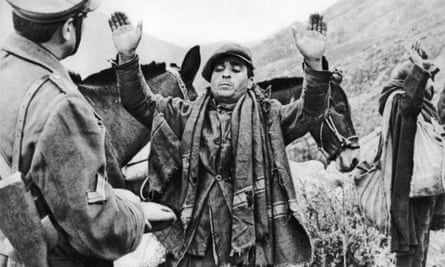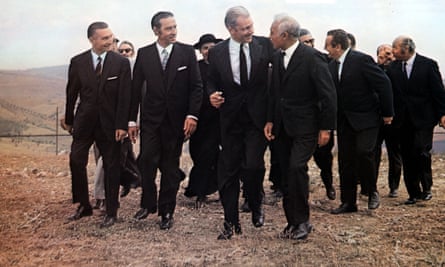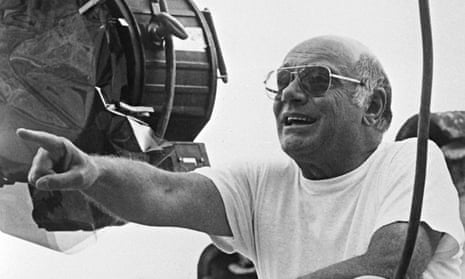In his best films, the director Francesco Rosi, who has died aged 92, was essentially a crusading, investigative journalist concerned with the corruption and inequalities of the economically depressed Italian south. He believed that “the audience should not be just passive spectators”: he wanted to make people think and question.
He established his international reputation with Salvatore Giuliano (1962), winning the Silver Bear award at the Berlin film festival. The film employed a documentary style to investigate the story of a notorious Sicilian bandit and folk hero, assembling a seemingly random series of flashbacks from the discovery of Giuliano’s bullet-ridden body in 1950, and exploring through the bandit’s life and death the socio-political complexities of postwar Sicily. With this labyrinthine structure, Rosi explained, he intended to convey “the impossibility of resolving the truth”. Gianni Di Venanzo’s black-and-white photography contributed hugely to the effect. “Black and white,” said Rosi, “is the only way to make good cinema … Black and white is imaginative, it’s a suggestion, not a limitation.”

Le Mani Sulla Città (Hands Over the City, 1963) used a strong dramatic story to denounce civic corruption and irresponsible building speculation in Naples, with Rod Steiger as the ruthless main character. This time, Rosi won the major Venice festival award, the Golden Lion. In 1965 he went to Spain to explore the contrasts between life in the cities and life in the country. Il Momento della Verità (The Moment of Truth) relates, again in documentary style, the rise and misfortunes of a peasant aspiring to be a bullfighter. This was Rosi’s first film in colour and was followed by the most uncharacteristic film of his career, C’era una Volta… (Cinderella Italian Style, 1967), a “realist fable”, set in Naples during the era of Spanish domination, and starring, uncomfortably, Sophia Loren and Omar Sharif. In contrast, again, in 1970 he adapted Emilio Lussu’s book Un Anno Sull’Altipiano (A Year on the Plateau) as Uomini Contro (Men Against), a ferocious picture of the human waste of the first world war and the inadequacies of a class-bound high command – a subject that had rarely been openly exposed in Italy until that time.
With Il Caso Mattei (The Mattei Affair, 1972), which won the Palme d’Or at Cannes in 1972, Rosi returned to his stride and to the subjects that most preoccupied him: power, corruption and the links between legitimate political establishments and organised crime. The film investigated the career and mysterious death of Enrico Mattei, president of Italy’s state-controlled petroleum concern. To emphasise his role as investigator, Rosi chose to show himself at work on the film within the film. The risks of this kind of investigative work were dramatically highlighted when one of Rosi’s researchers, the journalist Mauro De Mauro, vanished for ever, after apparently having found out too much about the case and, incidentally, about the drug traffic between Sicily and the US. Mattei was played by Gian Maria Volonté, who worked in five of Rosi’s films, and in whom Rosi valued “not only a political consciousness but also a profound consciousness of the psychological structure of the character”. Volonté collaborated on the research for the film.

Norman Mailer called Rosi’s Lucky Luciano (1973) “the finest movie yet made about the mafia, the most thoughtful, the truest and most sensitive to the paradoxes of a society of crime”. Again it was an open-ended investigation, this time into the US-Italian politics that lay behind the repatriation of the mafia boss Lucky Luciano. Rosi showed the criminal as an old, sick and tired man, and deliberately avoided the depiction of violence: “I wanted to record his sunset … My intention was not so much to portray the horror of violence but the horror of living in a world which is built around violence.” Rosi was permanently fascinated by the mafia as “a parasitical intermediary between property and labour, producer and consumption, and between the citizen and the state”.
Rosi was born in Naples. After studying law at university, he tried his hand at book illustration and was a reporter for Radio Napoli. When he moved into theatre and film, he was fortunate in his mentors. In the theatre he worked with the gifted director Ettore Giannini and, in the late 1940s, he made his entry into films as assistant director to Luchino Visconti on La Terra Trema (The Earth Trembles, 1948). He was both assistant director and a co-writer on Visconti’s next feature film, Bellissima (1951), and worked as assistant director to Luciano Emmer, Michelangelo Antonioni and Mario Monicelli.
His first chance to direct came when he was assigned to complete the costume drama Camicie Rosse (Red Shirts, 1952) after the director Goffredo Alessandrini left the production, apparently because of growing rifts with the film’s star, his own wife, Anna Magnani. In 1956 Rosi collaborated, as technical director, with Vittorio Gassman on Kean, in which Gassman over-indulgently directed himself in the title role, playing the flamboyant Shakespearean actor.
Rosi’s solo directorial debut came with La Sfida (The Challenge, 1958), which won a prize at the Venice film festival that year. Its dramatic exposé of corruption in the retail trade in Naples clearly announced Rosi’s social preoccupations, as did I Magliari (The Weavers, 1959), which dealt with the lives of Italian immigrants in northern Europe.
After his real-life investigations of the 1960s and 70s, with Cadaveri Eccellenti (Illustrious Corpses, 1976), adapted from Leonardo Sciascia’s novel Il Contesto (The Context), Rosi turned to a fictional story which nevertheless still explored the enigmas of power and corruption. The story, staged as a stylish thriller, is set in an unidentified country where a solitary policeman (Lino Ventura) investigates the serial killings of prominent judges.
From this point, mostly working with literary adaptations, Rosi’s career seemed to lose much of its first impetus. Cristo si è Fermato a Eboli (Christ Stopped at Eboli, 1979) adapted Carlo Levi’s recollection of his exile to Lucania under the Nazi regime, with Volonté playing Levi, and was made in alternative versions, for TV and cinema. Tre Fratelli (Three Brothers, 1981) transferred a story by Andrei Platonov to modern Italy: three brothers reunited at the funeral of their mother symbolise different aspects of contemporary society. Rosi’s 1984 screen vision of Bizet’s Carmen, finely performed (under conductor Lorin Maazel), and superbly photographed by Pasqualino De Santis, endeavoured to reconcile realism and operatic stylisation. Cronaca di una Morte Annunciata (Chronicle of a Death Foretold, 1987), an adaptation of Gabriel Garciá Márquez’s novel, enabled him to return to the investigative style of Salvatore Giuliano, in a murder mystery set in a small Colombian community, steeped in tradition and the religious bigotry that Rosi abhorred.
La Tregua (The Truce, 1996) was the culmination of a long-cherished ambition. Rosi had bought the rights to Primo Levi’s memoir of his postwar homeward odyssey from Auschwitz, a week before the writer’s death. It was several years before he could bring himself to ask the Levi family for their authorisation to make the film; and then several more were spent in preparation and raising the budget for an international co-production. Rosi interpreted Levi’s title as indicating the temporary state of peace in man’s naturally warring condition, though for Levi it had a more personal sense in terms of his readjustment after Auschwitz. The result was sincere, accomplished and with a respectful performance by John Turturro as Levi, but finally lacking vitality.
When he completed La Tregua, Rosi was already 74, but had no intention of stopping work: “I shall go on directing as long as I have the energy and the possibility to do so.” However, he found himself out of key and out of sympathy with a contemporary cinema which no longer seemed to care for the larger social issues that preoccupied him. Late in his life he complained: “Young talents of Italian cinema only make films with very personal, very individual subjects, centred on the intimacy of a character, to the detriment of stories about the relationships between man, woman and society. I only hope that one is going to find a means to encourage young directors to get out of this ‘intimacy’, because a film is not a novel.”
Rosi’s wife, Giancarla Mandelli, died in 2010. He is survived by his daughter, Carolina, an actor.
David Robinson
John Francis Lane writes: I treasure many experiences of watching Francesco Rosi at work, not least from my cameo roles in The Moment of Truth and Lucky Luciano, and interviewing him for a BBC Arena film in 1985. But the most extraordinary event happened in Sicily in 1962 when he organised a special screening of Salvatore Giuliano for the people of Montelepre, the village where the bandit was born. Rosi had shot much of the film in and around that bleak village in the hills above Palermo. I was among the group of journalists taken on a junket to Palermo, first for a debate on the mafia with local politicians and intellectuals, and then up to Montelepre for the screening, scheduled at 9pm in the local cinema. But word reached Rosi in the afternoon that the cinema had already been occupied by the locals and the crowd was getting belligerent, refusing to pay to see the film dedicated to the lad they knew as Turiddu, like the hero of the opera Cavalleria Rusticana.
By the time we arrived, they had been promised that the film would be shown for free to the whole population in the main square. It was after 11pm before the improvised screen and projector could be set up. The people of Montelepre – or, more strictly, most of its men – had brought their chairs out into the piazza and waited impatiently. The film was shown in almost total silence. The only momentary reaction came during the scene when the men of Montelepre are rounded up by the police and their women protest. Rosi explained to us later the reason for this reaction. The real women of Montelepre had refused “to play themselves”. Rosi had been obliged to send his assistants to Palermo to round up women around the port, mostly prostitutes whom the young men in particular recognised. I heard one say sourly, “It’s an insult to our women.” But they could only murmur among themselves.
The film finished well after 1am. There was no applause. Probably it was not the film they had expected to see about their Turiddu. Who knows if their grandchildren in Montelepre preferred The Sicilian, the more glamorous film that Michael Cimino made on the same subject many years later? Certainly, they would have seen it more comfortably, on their TV screens.
Francesco Rosi, film director, born 15 November 1922; died 10 January 2015

Comments (…)
Sign in or create your Guardian account to join the discussion